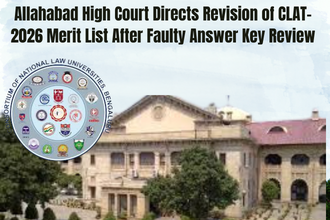In a strong message to the judiciary across the country, the Supreme Court of India has taken exception to inappropriate and insensitive comments made by a judge of the Allahabad High Court in a rape case. The apex court emphasized the need for judges to maintain restraint and avoid victim-blaming, especially in cases involving sexual violence.
This development comes in light of a bail order passed by Justice Sanjay Kumar Singh of the Allahabad High Court on March 11, 2025, where he granted bail to an accused arrested for an alleged rape, and remarked that the woman “invited trouble” upon herself. The comment drew sharp criticism, prompting the Supreme Court to intervene.
Background: Bail Granted with Controversial Observation
The case in question involved a woman who met the accused at a bar in Hauz Khas, Delhi, and was later allegedly raped by him. The accused was arrested in December 2024. While granting bail, Justice Singh made a controversial remark implying that the woman was responsible for her own victimization.
This observation, although not essential to the legal reasoning of the bail order, attracted severe backlash for perpetuating harmful stereotypes and shifting the blame onto the victim, a practice long condemned by activists and legal experts alike.
Supreme Court’s Firm Response
A bench comprising Justice BR Gavai and Justice Augustine George Masih took strong exception to the remark during the hearing of a suo motu case initiated by the apex court.
“Yes, bail can be granted. But what is this discussion that ‘she herself invited trouble’? One has to be careful when saying such things, especially on this side [judiciary],” Justice Gavai stated.
The court emphasized that while judges have the discretion to grant or deny bail, it is crucial that their remarks do not display a lack of sensitivity or reflect personal biases. Such comments, the bench observed, have the potential to influence public perception and undermine the trust in the judiciary.
Solicitor General Tushar Mehta, appearing before the Court, also weighed in, saying:
“Complete justice should not only be done but also seen to be done. How a common person perceives such orders will also have to be seen.”
Supreme Court’s Earlier Intervention in a Similar Case
This was not the only instance where the Allahabad High Court’s handling of a sexual offence case came under scrutiny. The Supreme Court had earlier intervened suo motu in another matter after a controversial judgment delivered by Justice Ram Manohar Narayan Mishra.
In that case, the High Court held that the act of grabbing a minor girl’s breasts, attempting to disrobe her, and trying to drag her beneath a culvert did not amount to rape or even an attempt to rape. The judgment downgraded the charges to lesser offences under IPC Section 354-B and Sections 9/10 of the POCSO Act.
The top court stayed that order on March 26, 2025, noting that the reasoning reflected a “lack of sensitivity” and appeared to be a considered conclusion rather than a hasty observation. The Court issued notices to the Central and UP governments and sought assistance from the Attorney General R Venkataramani and Solicitor General Tushar Mehta.
Misapplication of Law and Judicial Responsibility
Both incidents raise serious concerns about the application of legal principles in cases of sexual violence. The Supreme Court, through its suo motu intervention, has reaffirmed that the judiciary must exercise caution and responsibility while handling such cases.
Statements that suggest a victim “invited” assault not only reflect patriarchal attitudes but also conflict with well-established principles of law and human rights. In rape cases, the Supreme Court has repeatedly emphasized that a victim’s past conduct or lifestyle should not influence the adjudication of the offence.
Legal Standards on Attempt to Rape
In the case heard by Justice Mishra, the High Court’s reasoning in downgrading the charge from attempt to rape (Section 376/18 of the POCSO Act) to aggravated sexual assault (Section 354-B IPC) was also problematic. The High Court stated:
“The facts are not sufficient to draw an inference that the accused had determined to commit rape.”
However, the law is clear that when an accused person takes a substantial step toward the commission of rape with the intention to do so, it qualifies as an attempt. Physical acts such as disrobing or forcibly touching intimate parts can be sufficient to establish an intent to rape, especially in the context of POCSO cases where the victim is a minor.
Public Reaction and Legal Community Response
The remarks by the High Court judges have triggered widespread outrage among women’s rights groups, legal professionals, and civil society organizations. ‘We the Women of India’, an advocacy group, brought the matter to the attention of the Supreme Court, urging the judiciary to intervene and correct what they termed as a miscarriage of justice.
Moving Forward: A Need for Sensitization
These developments underscore a pressing need for judicial sensitization on gender issues and crimes against women. Several legal reform commissions, including the Justice Verma Committee, have stressed that judicial officers should undergo gender-sensitivity training and continuous legal education on how to handle cases of sexual violence.
Moreover, victim-centric jurisprudence is the bedrock of criminal justice in such cases. Remarks that put the blame on victims not only hinder justice but also discourage survivors from coming forward.
Conclusion
The Supreme Court’s sharp response to the Allahabad High Court’s observations is a crucial step in re-establishing public faith in the justice system. While judges enjoy discretion in interpreting the law, this discretion must be exercised with utmost care, especially in cases that involve trauma, stigma, and societal pressure.
Justice must not only be done—it must be seen to be done with compassion, fairness, and an unwavering commitment to the rights of survivors.
The legal fraternity now looks toward the upcoming hearing, scheduled after four weeks, to see how the Supreme Court will shape future judicial conduct and interpretation in such sensitive matters.


